#sale taxes
Text
Tax Services | Tax Consultancy | NTN Registration | Sale Taxes | Taxation Services
Ways tax offering in-depth, up-to-date tax services based on an intrinsic knowledge of the relevant local rules and regulations and strategy, transaction planning.
Tax Services | Tax Consultancy | NTN Registration | Sale Taxes | Taxation Services
0 notes
Text


Preorder will go live on my kofi at 1:00 PM EST on April 6th!
Shipping is 6 USD for United States, 20 USD for Worldwide. Shipping is possible to any country covered by USPS. If your country has any specific shipping stipulations that you know of, when it comes time for the preorder you'll have my email to contact me about any of those extra concerns!
There will be 100 made; manufacturing is currently underway for the lil guys. I'll be sure to update my kofi with further info about the process as it goes along!

#mine yoshitaka#rgg#shameless capitalism#yakuza 3#honestly ty to nati for recommending i look into bigcartel it looked sick bc it remitted sales tax#but unfortunately they required i get a paypal business acct which IN TURN required i open a business account with my bank#which they denied me without a state business license which would be fees and more waiting and registration#like PLEASE I DONT WANT TO START A BUSINESS IM JUST SELLING OFF THE EXCESS HORSIES#needless to say i stuck w kofi but if i ever do get a business going i really do think bigcartel looks neat#taxes: my true enemy#anyways poll i got kind of went around 60- 70 USD for what people were willing to pay for him? so I tried to keep it within that margin#considering shipping
90 notes
·
View notes
Text
At Tax Appointment

#the tax lady is an elderly woman who isnt sure how online content and digital sales like art works#wish me luck
748 notes
·
View notes
Text
Carlos getting arrested for singing his special little sales tax calculating song :(
#wtnv#welcome to night vale#wtnv spoilers#wtnv 229#final full#carlos the scientist#special little sales tax calculating song#carlos' special little sales tax calculating song
320 notes
·
View notes
Text

i'm having a sale over on my inprnt shop! you get cool spooky prints at a huge discount, i get enough money to pay rent after i pay my taxes, we both win!
🫀 discount code for easy copy-pasting: JDENTM 🫀
reblogs & boosts are super appreciated! if there's any art of mine that isn't up there in print form that you'd like a print of, let me know! thanks so much!
#inprnt#prints#art prints#artists on tumblr#horror art#haunted house#haunted houses#hauntings#art sale#kaylee.txt#i've spent all day being very anxious about taxes - this is the first year i've been full-time freelance and it turns out self-employment#taxes are Quite A Lot. so! if you'd like to buy a print i'd really appreciate it!#at the very least this gave me an excuse to do some relaxing hand-lettering haha
329 notes
·
View notes
Text
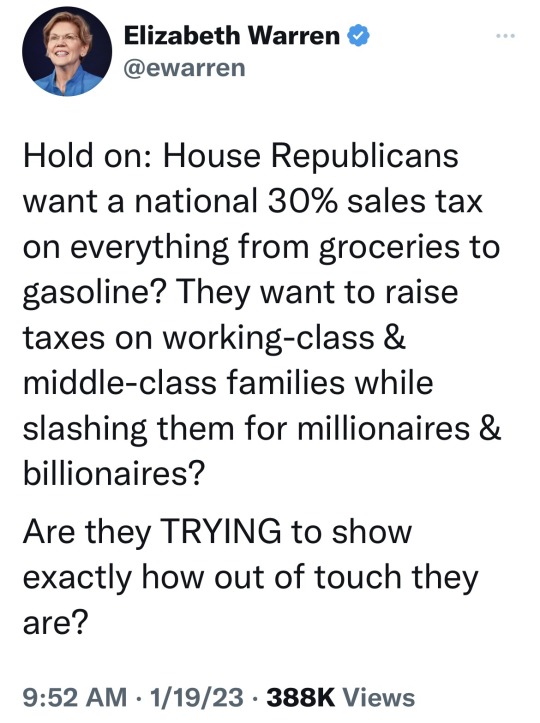
611 notes
·
View notes
Text
The U.S. Department of Treasury’s gift to electric-vehicle shoppers (and global automakers) for the new year was to make many more EVs and plug-in hybrids eligible for the federal tax subsidy of up to $7,500 — including vehicles built outside North America — as long as drivers lease them or buy used rather than buy new.
EV credits and [rules] took effect Jan. 1.
One category extends the former credit of up to $7,500 for consumers buying new EVs and PHEVs, but it puts new limits on vehicle price and buyer income and will soon add requirements for the sourcing of EV batteries and materials. Additionally, since August [2022], it has required that the vehicles be assembled in North America.
A second is a new credit of up to $4,000 for buyers of used EVs.
A third is a “commercial” credit for businesses acquiring EVs. It offers up to $7,500 for light-duty vehicles (under 14,000 pounds) and up to $40,000 for heavier vehicles. Significantly, the commercial credit does not have the origin, price or other restrictions of the credit for consumer buyers.
On top of all that, the Department of Treasury guidance released at the end of December allows the less restrictive commercial credit to also apply to vehicles leased by consumers; that means most plug-in and fuel-cell EVs currently on the market can qualify, including those built in Europe or Asia. The credit goes to the leasing company — the vehicle owner — but it can be passed to the consumer in the form of lower lease payments.
The new federal rules do not affect state and local subsidies available for EV buyers [which may be able to get you even more savings].
-via Cars.com, January 12, 2023
#evs#electric vehicles#electric cars#ev sales#ev adoption#united states#irs#tax credits#democrats#inflation reduction act#biden administration#used cars#leasing a car#saving money#money#good news#hope
77 notes
·
View notes
Text
if rich people want to stop paying taxes so bad they should just. have no job or assets or property or income. ez.
50 notes
·
View notes
Note
Ever had to deal with paper work from any type of farmer in your accounting endeavours? Let me tell you it is an adventure. When you get their paperwork the first question you want to ask but don’t ask is what is that smell? The question you actually do ask them is where’s the rest of the paperwork? and they go oh Jim bob was driving down the highway with the windows open and half of it flew out the window. So you say ok well unless you can prove that the several hundred dollars you spent at (store unrelated to farming) is a business expense I’m not going to record it as a business expense and then they get mad because apparently you’re wrong and cows can go in a jacuzzi??
we have one department head who, because of the nature of his department (think grounds maintenance) always comes in with greasy hands smelling like cigarettes but also sometimes skunks (because he catches skunks). he cannot use a computer. in order to type his monthly reports someone has to open word for him so that he can use it like a typewriter. everything he turns in is crinkled from being in his pockets. i was not looking forward to dealing with Any Of That when i first started but it turns out he's a delight to work with. his invoices are crumpled but they're always in on time. he turns in purchase orders before we get billed. paperwork for his employees shows up at my desk without me ever having to ask. i would take another ten of him over the guy who keeps finding equipment deals on facebook marketplace and paying out of pocket before writing himself reimbursement authorizations.
#original#facebook guy also keeps failing to record hot food sales properly resulting in 100% of all sales for those days getting taxed RIP
329 notes
·
View notes
Text
I'm looking for non-Amazon options for book sales, by popular demand. Any sites people use/recommend? Gumroad currently seems promising.
#my requirements are 'only takes a small cut of profits'#and 'deals with sale taxes for me'#the infinity of local sales tax laws are ridiculous and apparently designed to make me go#yeah I would like someone else to be legally responsible for that#Fox's Tongue will be out soon!#just in the infinite cycle of small changes and proof copies#self-publishing#writers
657 notes
·
View notes
Text

I got this at a mall today, it was still shrink wrapped when I bought it so as far as I could tell it was mint. But I opened it and I think there's a disc missing, i think maybe it's Disc 2 of season 2, part 1 (that's a mouthful, but that is how they chose to label these...). I looked online and I'm supposed to have 10 DVDs in here but I've counted over and over and there's only nine. Here's pictures of the DVDs in the set:
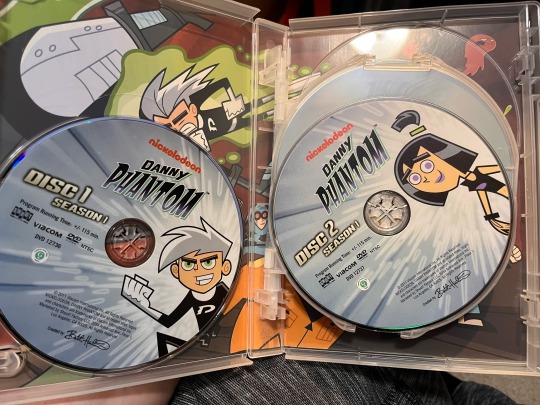
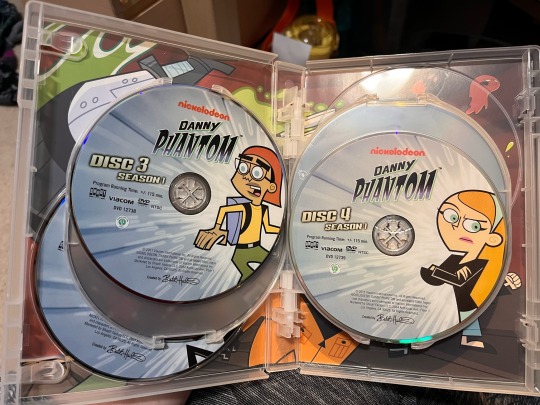
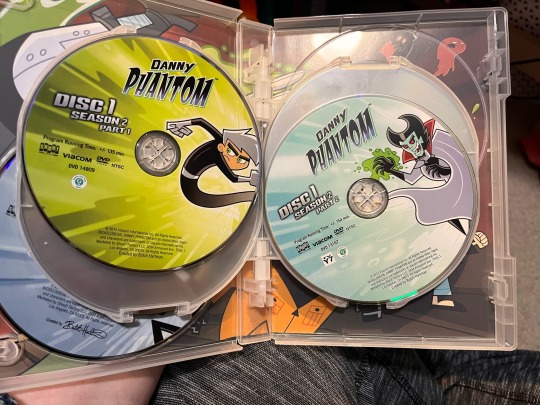
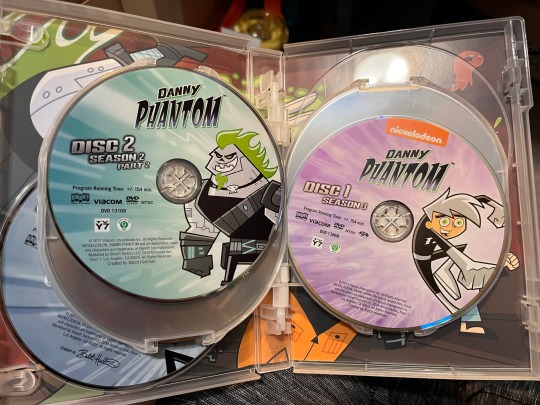
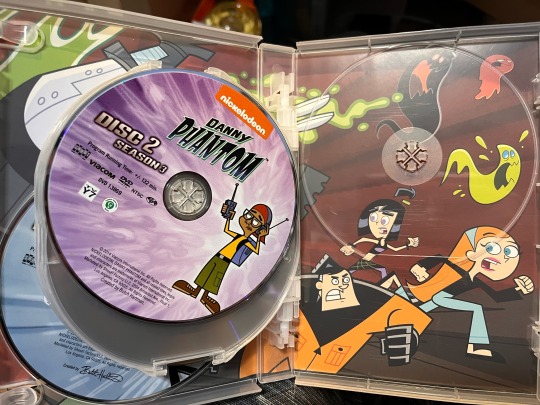
I think the spread where Danny on a green background is opposite Vlad is supposed to have another dvd in between. Am I understanding this right? I can't play these to verify until later, I just wanted to see what the box art looked like on the inside...
#ghostly posts#mannn I bought this at a mall that sells used media. do they even make these anymore to be able to complete the series???#the mall was literally in a different state I paid SALES TAX to not get the full set abskdndbdh#danny phantom#-> also I understand that lots of box sets use the same base and often end up with an empty back#so like that empty slot is not what makes me think I'm missing one#what made me confused is how there's like#disc 1 season 2 part 1. and then disc 1 season 2 part 2. and then disc 2 season 2 part 2.#I was like 'wouldn't part 1 of season 2 be equally as long as part 2?'#and I have seen multiple sources say that there's ten discs after looking it up.
22 notes
·
View notes
Note
Do all cons in the US require I get a sales tax permit? Also can I use one permit for all states?
Kiriska: Most major conventions will require a sales tax permit. Some even require the permit just to apply to the con. Some may not, but you should always check specific cons for their requirements. I'd recommend being permitted even if the con doesn't require it.
Every state has its own sales tax system, so you need to get an individual permit for every state that has a sales tax. Yes, it's a pain, but that's the reality of doing business across state lines. (States without sales tax don't require sales tax permits, but may require other paperwork.)
I highly recommend also having regional sales tax programmed into your POS and setting a reminder to switch/update them between shows. Sales tax can vary between cities and counties, in addition to state, and you're likely going to need to report the amount for each region.
For example, I mostly just vend in Washington state these days, but I still have individual tax rates in Square for Seattle, Tacoma, Unincorporated King County, Bellevue, Lake Forest Park, Olympia, etc... When I report sales tax annually, I separate out and report the sales per region, because they all have different tax rates.
✨Small biz lyfe ✨
Further reading: #sales tax, #taxes, #permits and licenses
29 notes
·
View notes
Text
I know most people are pissed off about income tax but I think that property tax is probably the Most Bullshit tax
#like#I already bought this thing#it's mine#how are you gonna#like imagine paying sales tax on something you bought ten years ago#the government just shows up and is like yeah I'm gonna need that 6% again#and you're like I paid that when I bought it#and they're like yeah see you next year bitch
300 notes
·
View notes
Text
International Taxes
Ko-Fi prompt from Ethan:
All I know about tariffs is that they're special taxes for international trade but people talk about them all the time. Please help explain
So we are going to talk about three things here:
Tariffs
VAT
Customs/Duties
I'll be using the US for most of my examples, because that's what I know best... and also because it's a very convenient example for the way VAT works on an international level.
Tariffs
You are correct that tariffs are special taxes for international trade. These are essentially fees that are applied to products being shipped in and out of a country in order to promote domestic product or impact a foreign one.
A common example is US steel. The United States has a fairly robust steel industry, and the government promotes that industry domestically by applying tariffs to imports. Back in 2018, Trump imposed a 25% tariff on steel imports and 10% on aluminum (something that the WTO said was illegal, but that's not relevant right now). The steel tariff had previously been a range of 8-30%, implemented by Bush in 2002. Prior to that, the steel tariff had generally been under 1%.
In applying that tariff, the federal government prioritized domestic purchasing. If domestic product is nominally $90 for one unit, and foreign product is $80, then it is cheaper and more appealing to buy from a foreign producer. With a 25% tariff, the foreign product is now functionally $100 per unit, making it more appealing to buy domestically. While the actual cost of the tax is born by the producing country, in the case of import tariffs, the result is the raising of costs when selling internationally.
Tariffs are also applied to specific countries. Once again using a Trump example, a $50 billion tariff was applied against China in 2018. This had negative impacts on the economy, as it led to worries of a trade war; China did retaliate by applying tariffs directly to specific products from the US, including wine and pork.
High tariffs theoretically lead to an increase in domestic trade, but they also lead to higher rates of smuggling. They are also a form protectionist policy, which was at its height in the 19th century for the US.
VAT - Value Added Tax
If you look up VAT, you get a lot of explanations that talk about how it is a tax that is levied against the consumer on the basis of the cumulative value of the product, and generally things are confusingly worded, so I'll save you some time:
It's sales tax.
If you are American like me, that's all it is. It's a different name for sales tax.
You get something for $8 at the store, but the final cost is $8.42? Those 42 cents are the VAT.
What does that have to do with international trade? Isn't that a domestic thing?
Well, yes and no. We'll start by comparing the US to most European countries.
See, the US has a different application of VAT than a lot of other places. In the US, sales tax is added at the very end of a purchase for the vast majority of places. This is because there is no federal sales tax. Instead, taxes are set by the state, county, and city governments. Take a look at this map of New York, and you'll see how much sales tax varies by just a few miles.
Given how much a pricing can vary from one town to the next, large corporations generate a greater profit by listing prices in their pre-tax form, and then adding that tax at the end. The consumer knows that there will be a higher price at the counter than is listed, because the standard in the US is to not include that tax. So your Arizona Iced Tea will be a $1 in Portland and $1 in Queens County, matching that promise on the can... but you'll still be paying $1 in Portland and $1.09 in Queens, because only one of those areas has sales tax, despite both being in the same country.
This works out for the retailer, because the consumer does not blame them for raising prices across county lines, if there is a sales tax hike. The thought of "it's cheaper ten miles down the road, I'll get to it later," followed by never getting to it and thus never making a purchase, is rarer, because the listed price is still the same. It also means having to print or design fewer price tags; imagine having to manually change every price in a supermarket magazine! Every coupon needs to have its price changed by a few cents, to account for tax!
...or you can just print the same magazine with the same prices and write "plus tax" after the listed cost.
All this to say, Americans are used to adding sales tax at the end, and knowing that the price they see is not the price they'll pay.
Other countries Do Not Do This.
I mean, some do. But we're talking about the ones that don't, which includes the entirety of the EU, India, some of Japan, and the country I actually have extensive experience with: Serbia.
I am currently in Serbia, which means I'm in a country with a sales tax/VAT that is higher than I'm used to (20% on most goods, 8% on essentials). In every store I've been to, the tax is included in the listed price. If it says 87 rsd on a carton of milk, I will be paying 87 rsd at checkout. The baseline price is 80 rsd, and then there's the 8% tax, and the final price is 86.4, which gets rounded up to the 87 that is listed on the tag.
If you aren't accustomed to thinking about VAT like in the US, online shopping can be... a trial.
If I purchase something from, say, Canada, and have it mailed to the US, I am given the sales tax as part of the purchasing process. It will format the receipt as the product plus sales tax. This is familiar to me.
To someone from the EU who does not purchase internationally (specifically from the US, Canada, or other countries that don't include sales tax in the sticker price), this tax can often come as a surprise.
And, finally, in some cases... the will be paid at the very end, at the point of pickup, along with customs. I recently purchased something from an English creator that was manufactured in Germany and then shipped to Serbia. I anticipated that I had paid the VAT for Serbia when purchasing the product. It was instead added at the point of purchase, as Serbia is neither in the EU nor in a trade agreement with the relevant countries that would allow for me to pay the VAT online, I had to pay the 20% in addition to customs when picking up the package from the postal office.
Despite not being a tariff or customs/duty payment, VAT can have a direct impact on international purchasing.
Customs/Duties
Customs and duties are taxes applied to products based on those product characteristics.
There is overlap with tariffs. As a consumer, you are... not going to be very affected by the difference between customs and tariffs.
Customs are like VAT, in that they are paid by the consumer rather than by the manufacturer.
You can think of tariffs as a fee that a manufacturer pays to sell something internationally (though that cost is often passed on to the consumer), and customs as a fee paid by a consumer to receive that good.
Hope this helps!
(And if anyone here is more familiar with the subject than I am, please feel free to add on or correct me! I'm generally pretty good about international policy, but I'm not an expert, and this subject can be a complicated one.)
(Prompt me on ko-fi!)
#taxes#tariffs#taxation#customs#duties#sales tax#vat#phoenix posts#ko fi#ko fi prompts#economics#ko-fi#economics prompts
98 notes
·
View notes
Text


Apollo Justice is a hilarious game actually
Y’all should play it
#The way I snorted with these aldjakdh#Full offense but this game is a delight and I am having such a blast with each case#I love Apollo I love Trucy I love Ema I love Klavier they’re a hoot#The games are currently on sale on the 2/3DS Nintendo e shop btw!! They’re all $5 plus taxes each!!#Vera Misham#Trucy Wright#Apollo Justice#Turnabout Succession#Apollo Justice: Ace Attorney#Ace Attorney#Ani Rambles
121 notes
·
View notes
Text




open for 10 halloween icon comms
details in my ko-fi shop!
20 notes
·
View notes